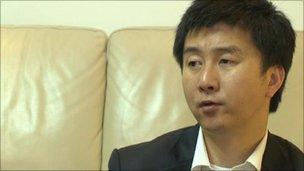'Life of hard labour' in North Korean camp
- Published

In the living room of my apartment in Seoul, Kang Cheol-hwan pores over satellite photographs of the place he once lived.
Known as labour camp number 15, in Yodok, North Korea, it is perhaps one of the world's most secret places.
"It was a life of hard labour," he says. "Thirty per cent of new prisoners would die. And we were so malnourished, we would eat rats and earthworms to survive."
Cheol-hwan lived in Yodok for a decade - paying the price for "political crimes" committed by his family.
Amnesty International says there are signs the number of people being sent to North Korea's political prison camps is growing, and that the new satellite maps show the system is thriving.
Torture reports
Cheol-hwan traces the outline of the camp on the map with his finger - snaking through North Korea's mountainous countryside.
New rows of buildings have appeared in one section of the camp. They are not there in photographs from a decade ago.
"This is the guards' block," he points out. "And it's grown. I assume it's because they need a bigger security presence now."
I ask him where he lived and he points to a row of box-like houses a few hundred metres from the guard block, a single road leading in and out.
Reports from inside the camps are scarce. But many of those who do speak out tell horrific stories of torture, starvation and summary executions.
The new Amnesty report details accounts of water-boarding, sleep deprivation, bamboo pieces placed under the fingernails and imprisonment - sometimes for months on end - inside a 4ft (1.22m) by 4ft cell.
Cheol-hwan remembers the prison block inside his camp, where the troublesome inmates were kept. It was where torture and beatings took place, he says.
'No return'
News is already filtering through the North Korean community here in Seoul of a wider crackdown taking place back home.
There is talk of listening posts, border fences and a sharp rise in public executions.
Kang Cheol-ho runs a church for North Korean defectors. He gets new arrivals every month and says the reports just get worse.
"I'm getting more and more dire testimonies all the time," he said. "That the clampdown is worse, the food situation is more severe and the authorities are making it clear, if you try and escape the country, you'll never get another chance.
"Nowadays, you'll be sent to one of these camps from which you may never return."
But reports like these pose a problem for South Korea: deciding what to do about them.
The country has been fiercely divided between those who believe it should tackle the North head-on about its human rights record, and those who say that simply makes conflict more likely, and risks everything the South has built.
Now though, there may be a sign that both sides are softening - at least in private.
Won Jae-chun has just been asked by the government to set up a new archive centre to document human rights abuses in North Korea.
Ten years ago, he says, it would have caused one hell of a row. Now, there seems to be a new consensus emerging.
"In the old days, it was either carrot or stick - but now it's carrot and stick," he explains. "Now it's talking about human rights but at the same time helping North Korea.
"People have reached a general consensus that we will try every means possible under the sun, and one way or another North Korea will change."
One reason for the change, he believes, is the growing information stream flowing from the North. There are 20,000 defectors here in the South now.
This is something that makes North Korea nervous. About the messages they are bringing out, perhaps, but also about the ones they are sending home.